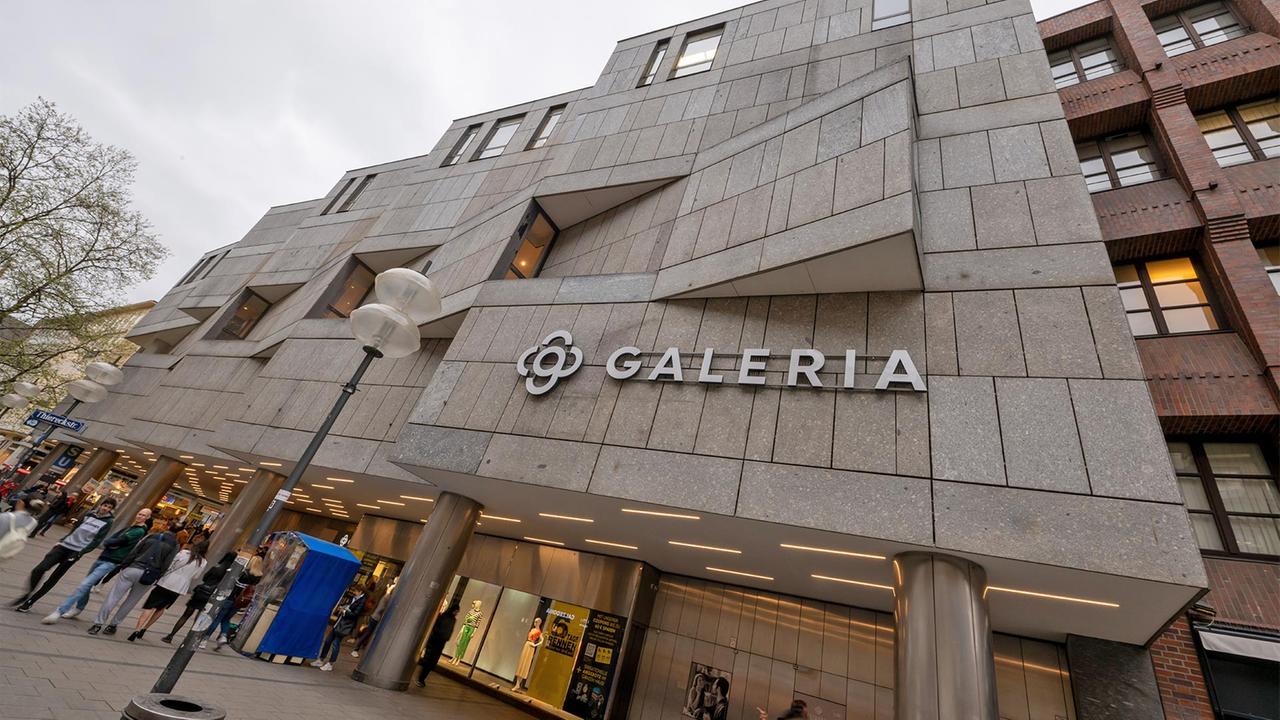Now it's official: Richard Baker and Bernd Beetz are joining the insolvent department store chain Galeria Karstadt Kaufhof as investors. They agree to keep most of the branches. But experts are skeptical.
With Bernd Beetz as president, the traditional football club SV Waldhof Mannheim was promoted back to the third division in 2019 – and managed to return to professional football. Now the investor, who lives in Switzerland, also wants to try to save Galeria Karstadt Kaufhof. Together with the US entrepreneur Richard Baker.
The fact that the two are now joining Galeria Karstadt Kaufhof as investors has been official since Wednesday. At a press conference, investor Beetz said: “We believe in the future of Galeria and have only one focus: the department store.” The 73-year-old further emphasized: “We want to invest, develop and grow in the long term.” The next few weeks are crucial to create the conditions for a solid business model. If these requirements are met, “we can put Galeria on a successful course,” says Beetz.
“Love for the department store”
The new owners are a consortium made up of entrepreneur Richard Baker's US investment company NRDC and Beetz's BB Kapital SA. About his relationship with Baker, Beetz said: “What connects us is our love for the department store. It is part of the German culture of life.”
The new owners are expected to continue operating more than 70 of the 92 branches. This is what Galeria insolvency administrator Stefan Denkhaus said. This makes it possible to preserve a large majority of jobs. The number of branches that are to be retained is part of the investor agreement, which was notarized on Tuesday.
Trading experts are skeptical
However, retail experts are skeptical as to whether the ambitious plan will succeed – and whether the ailing department store chain Galeria Karstadt Kaufhof will fare like SV Waldhof Mannheim after the investor entry. Boris Hedde, Managing Director of the Institute for Trade Research (IFH Cologne), says tagesschau.de: “These are buildings in highly frequented, attractive locations. I am convinced that they can once again be an anchor for the city centers.”
The only question is whether the new investors want to push ahead with a consistent restructuring – and invest the appropriate money for it. The department stores of the future would need a completely different concept: “We are no longer looking for goods in the city center, but rather experiences.” People no longer wanted to go into the city just to shop. “They want to drink a coffee, educate themselves, work, maybe even go to music school,” says Hedde.
How much are the new owners investing?
Retail expert Jörg Funder sees exactly this as a problem: “You have to invest a relatively large amount of money in order to turn existing department stores into experience centers,” says the professor of corporate management in retail at the University of Worms Mr. And he doesn't think investors want to invest large amounts of money in modernization. “I expect that they will adopt a low-risk model and make space available to other sellers.”
Baker and his National Realty and Development Corp are a private equity firm and seek returns. “I can imagine that of course they also want to make short-term profits. And that is only possible by withdrawing money from the inventory,” says Hedde.
Department stores make little profit
The problem: There is a small margin in retail anyway – not particularly attractive for investors. “In addition, department stores as they are currently structured are not a growth market – on the contrary,” says the managing director of IFH Cologne. There is little profit to be made there either.
So there remains one last, short-term return option: skimming from the inventory. The former Karstadt investor Nicolas Berggruen has done this before – for example with higher rental costs for brand use and branches as well as more expensive special services, says Hedde.
“Don’t go around individual fates”
Jörg Funder also emphasizes: “These are not social investors. I don't think that they are interested in individual fates and people, but rather that it is about money and returns and about making a difference.”
He believes it is realistic that of the currently more than 90 branches only a handful will remain after restructuring: “I think 20 branches is a realistic number. Anything beyond that is a concession to the insolvency administrator so that you can gets the contract and continues to operate the houses for a certain period of time,” he says.
Experts expect further closures
After a transition period, it can be assumed that the investors will close more branches and only continue to operate the really profitable locations, said Funder. From his point of view, the closures could particularly affect smaller cities. “Why should you run a department store in a medium-sized city with 100,000 or fewer residents? I think it's becoming increasingly difficult.”
Galeria's general works council declared that it would be available to the new owners “for constructive cooperation that would secure jobs.” It is clear that there will be tough cuts again. “But thousands of jobs will also be preserved,” it said in a statement.
City Council sees “chance for a new start”
The German Association of Cities assessed the agreement with investors positively: “Many cities with Galeria locations will breathe a sigh of relief today,” said Managing Director Helmut Dedy. “With the separation from the Signa Group, these companies have a real chance of a fresh start.”
What is important for the cities is that the remaining locations are given a future perspective on which they can build, says Dedy. “This applies especially to the many employees in the Galeria branches. They have repeatedly had to worry about their jobs for months.” But department stores in city centers also remained anchor points and contact points for local people.
Insolvency plan until the end of April
Ver.di federal board member Silke Zimmer expressed the union's expectation that the new owner would invest in the company, maintain the locations and secure long-term jobs for the employees. “The new owner should work with the employees to develop and launch a modern future concept that plays to the strengths of the department stores: a wide range of products paired with good advice.”
The signed takeover agreement will only come into force if the Essen district court and the creditors' meeting approve the insolvency plan drawn up by Denkhaus. If they don't do that, the sale won't happen. Denkhaus wants to present the insolvency plan by the end of April. The creditors will meet on May 28th at the Essen Messe to vote on it.
Jörg Marksteiner, WSR, tagesschau, April 10, 2024 5:21 p.m




